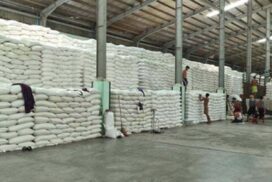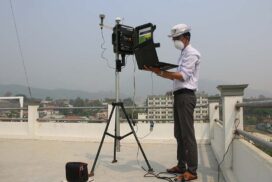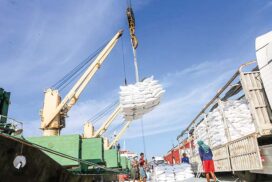Many global countries including Myanmar are facing challenges to the insufficiency of food triggered by climate change and political instability. However, the difficulties of global countries at present occur good opportunities for the countries producing agro-based foods similar to that of Myanmar.
As Myanmar needs to strive for boosting the production of export-quality products so as to improve the growth of the State economy, priority must be given to the expanded cultivation of quality and high-yield paddy strains and the increase of export volume.
In the summer paddy cultivation season, the government will disburse special loans to farmers at K200,000 per acre of summer paddy, totalling K140 billion for implementing the contract farming system. Such loans should be spent on the purchase of inputs such as quality strains of paddy seeds and fertilizers. So, all stakeholders need to systematically cooperate with each other in implementing the plan. Production of paddy aims to produce quality paddy and the milling process must be done for the production of good quality grains meeting the set standards.
Before regaining independence, Myanmar was a country exporting the largest volume of rice across the world, grasping a large market share of the world rice market. After regaining independence, successive governments have been emphasizing local oil sufficiency. Due to such a policy, the country declined to a low level from the world’s top rice exporter country.
After many decades, the country faced changes in policies of rice, allowing businesspersons to independently trade rice at home in 2003, and they were fully allowed to export rice to the foreign market in the 2007-08 financial years. In the 2017-2018 financial year, more than 3.6 million tonnes of rice to the foreign market, reaching the list of five world’s top rice exporter countries list.
In truth, Myanmar’s export quality rice must have the capacity to keep abreast of other countries standing atop the rice exporter countries. To do so, the quality of Myanmar’s rice must be high. On the other hand, rice mills and rice warehouses must have a higher standard for their functions. Likewise, farmers must do proper processes of cultivation, harvesting, threshing and winnowing and storage without chemical residues, pests and dust.
In truth, Myanmar’s export quality rice must have the capacity to keep abreast of other countries standing atop the rice exporter countries. To do so, the quality of Myanmar’s rice must be high. On the other hand, rice mills and rice warehouses must have a higher standard for their functions. Likewise, farmers must do proper processes of cultivation, harvesting, threshing and winnowing and storage without chemical residues, pests and dust.
As part of efforts to develop the State economy, all businesspersons including exporters, farmers and the government need to join hands in uplifting Myanmar’s exporter position to the world’s top export country by selling quality rice to the international market.













